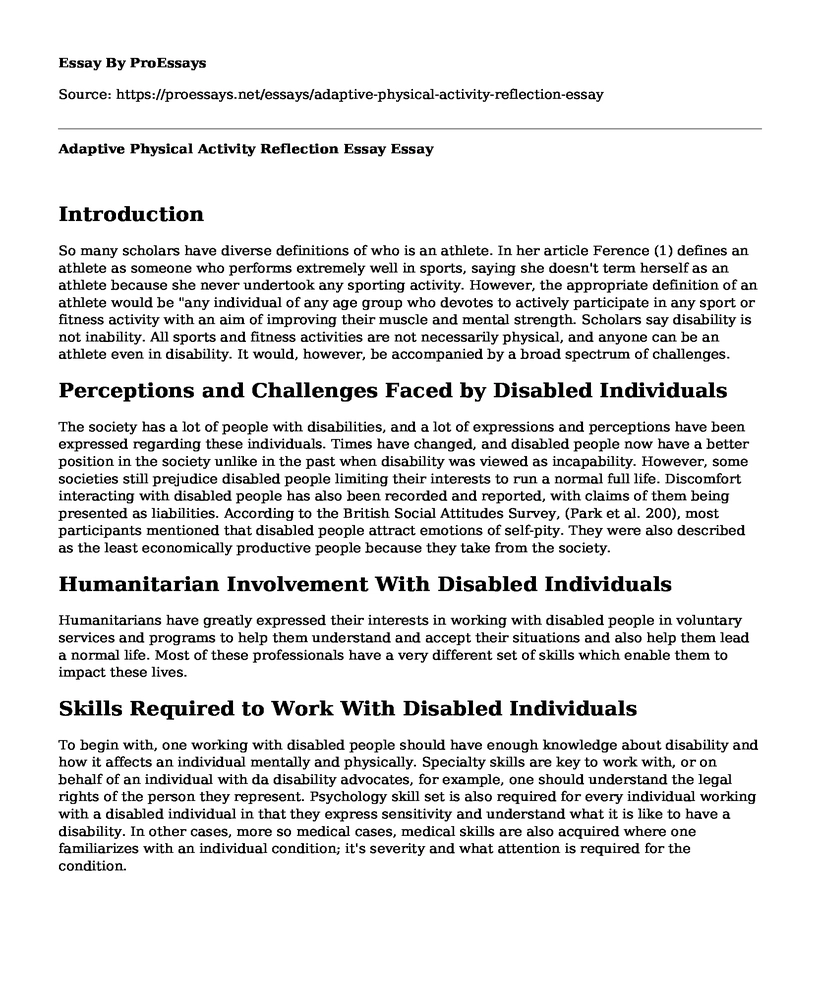Introduction
So many scholars have diverse definitions of who is an athlete. In her article Ference (1) defines an athlete as someone who performs extremely well in sports, saying she doesn't term herself as an athlete because she never undertook any sporting activity. However, the appropriate definition of an athlete would be "any individual of any age group who devotes to actively participate in any sport or fitness activity with an aim of improving their muscle and mental strength. Scholars say disability is not inability. All sports and fitness activities are not necessarily physical, and anyone can be an athlete even in disability. It would, however, be accompanied by a broad spectrum of challenges.
Perceptions and Challenges Faced by Disabled Individuals
The society has a lot of people with disabilities, and a lot of expressions and perceptions have been expressed regarding these individuals. Times have changed, and disabled people now have a better position in the society unlike in the past when disability was viewed as incapability. However, some societies still prejudice disabled people limiting their interests to run a normal full life. Discomfort interacting with disabled people has also been recorded and reported, with claims of them being presented as liabilities. According to the British Social Attitudes Survey, (Park et al. 200), most participants mentioned that disabled people attract emotions of self-pity. They were also described as the least economically productive people because they take from the society.
Humanitarian Involvement With Disabled Individuals
Humanitarians have greatly expressed their interests in working with disabled people in voluntary services and programs to help them understand and accept their situations and also help them lead a normal life. Most of these professionals have a very different set of skills which enable them to impact these lives.
Skills Required to Work With Disabled Individuals
To begin with, one working with disabled people should have enough knowledge about disability and how it affects an individual mentally and physically. Specialty skills are key to work with, or on behalf of an individual with da disability advocates, for example, one should understand the legal rights of the person they represent. Psychology skill set is also required for every individual working with a disabled individual in that they express sensitivity and understand what it is like to have a disability. In other cases, more so medical cases, medical skills are also acquired where one familiarizes with an individual condition; it's severity and what attention is required for the condition.
Motivation in Working With Disabled Individuals
Motivation while working with people with disability is the best attitude that an individual can express. Being motivated to work with disabled people gives one an opportunity to let them learn and grow. It is understandable that the feeling might be unsatisfactory, and one may feel nervous in the beginning, but when one is committed, they can provide support.
Careers such as being a Behaviour Analyst, which is my inspiration, need the experience of working with disabled individuals. One gets an opportunity to view life from diverse perspectives, for example, working with people who have autism, which deploys dangerous self-injurious behaviors. Furthermore, seeing people make progress in therapy is a source of mental and emotional motivation.
Conclusion
In conclusion, disability is part of our daily life, and it should not be treated as inability. Sovereign governments and organizations should put measures against disability discrimination and stigmatization. Disabled people should be given equal opportunities to shine in the society. More so, resources towards enhancing the disabled, which are currently rare, should be made diverse to cater for all conditions effectively.
Works Cited
Ference, J. (2015). Blitz Conditioning: Who is an athlete. Retrieved from https://www.blitzconditioning.com/who-is-an-athlete/
Park, Alison, John Curtice, Katarina Thomson, Lindsey Jarvis, and Catherine Bromley, eds. British social attitudes: The 19th report. Sage, 2002.
Cite this page
Adaptive Physical Activity Reflection Essay. (2022, Aug 04). Retrieved from https://proessays.net/essays/adaptive-physical-activity-reflection-essay
If you are the original author of this essay and no longer wish to have it published on the ProEssays website, please click below to request its removal:
- Emotions Influence on Athletes and Teams Paper Example
- Essay Sample on Sporting Risk Management Decisions
- Women Athletes & Gender Inequality: The Unequal Playing Field - Research Paper
- Athletics and Social Life: Examining the Impact of College Athletics - Essay Sample
- Essay Example on Houston Roughnecks: Rising Pro Football Team in TX from XFL
- Essay on Footballers and Cancer: Heroes Defying the Odds
- Paper on Explosive Strength: Measuring Power Through the Vertical Jump Test







